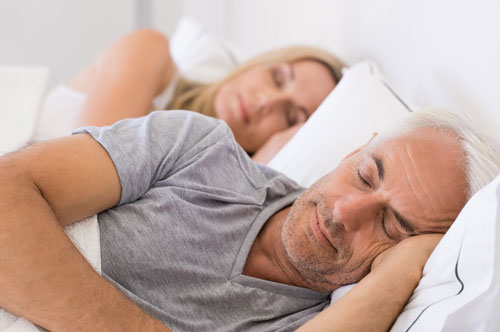Most of us think we know the things that lead to a heart attack…
They include lack of exercise, a bad diet, obesity, smoking, genetics, high blood pressure, cholesterol, and diabetes.
But a new study shows that another factor may be just as important as any of these.
The research was published in the Journal of the American College of Cardiology. Scientists analyzed the sleep habits, genetic information, and medical records of 461,000 people. They followed them for seven years.
People who slept fewer than six hours a night were 20% more likely to have a heart attack. People who slept more than nine hours were 34% more likely.
The risk was higher as people moved to the extremes, whether it be a little sleep or a lot. People who slept just five hours had a 52% increased heart attack risk. People who slept 10 hours doubled their risk.
Six to nine hours is the “Goldilocks zone”…just the right amount of sleep for optimal heart health.
Professor Celine Vetter was the senior author. She said that just as “working out and eating healthy can reduce your risk of heart disease, sleep can too.”
5 Natural Ways to Fall Asleep
It’s important for your heart to get not too little, not too much…just the right amount of sleep.
If you find that you have trouble falling asleep or staying asleep, try these natural solutions.
- Take a warm bath or shower right before bedtime. Body temperature is linked to the regulation of sleep cycles. Your temperature naturally drops at bedtime. Taking a bath, even though you’re using warm water, helps your body cool down. This brings on sleep.[1]
For best results:
- Bathe or shower about 90 minutes before bedtime.
- Keep the water temperature at between 104 and 109 degrees Fahrenheit. (Bath thermometers are available from online retailers and department stores.)
- Stay in the water for a minimum of 10 minutes.
- Lower carbon dioxide (CO2). Research shows that breathing more oxygen and less carbon dioxide leads to better sleep. We breathe out CO2 naturally. So a tightly sealed bedroom can reduce oxygen and raise CO2 levels.[2]
Sleep with a door or window open. A window is better. Running your air conditioner also lowers CO2.
- Drink tart cherry juice. Research from Louisiana State University found that people who drink tart cherry juice increase their sleep time by an average of 84 minutes a night.[3]
Tart cherry juice is available in frozen, canned, and concentrate forms. All contain nutrients that aid sleep. But try to find an organic version with no added sugar. They are available at health food stores and online.
- Exercise daily. Exercise during the day helps you sleep at night. But don’t exercise within three hours of bedtime.
- Avoid blue light after dark. A Harvard Medical School study found that using blue light-emitting devices like computers, tablets, and smartphones just before bedtime can wreck your sleep. Blue light suppresses melatonin, the hormone that makes you sleepy. If you are a bedtime reader, stick to an old-fashioned printed book.[4]
You need to get a good night’s sleep for many reasons. Now we know heart health is among the most important.
Editor’s Note: Research shows the standard heart disease treatments—stents and statin drugs—don’t prevent heart attacks. Discover what does. Get the Heart Smart Protocol. It’s a simple, science-backed plan that prevents and treats America’s number-one killer naturally, without drugs or procedures. You’ll find it in our monthly journal, Independent Healing. Subscribe HERE.
Related Articles
The Best Sleep Position for Good Health
Yes, Fish Oil Is Good for Your Heart
Carrying Extra Fat? Location Is Key to Heart Health
Like this Article? Forward this article here or Share on Facebook.
[1]https://www.sciencedirect.com/science/article/abs/pii/S1087079218301552?via%3Dihub
[2]https://consumer.healthday.com/sleep-disorder-information-33/misc-sleep-problems-news-626/seeking-better-sleep-here-s-one-simple-step-to-help-728763.html
[3]http://www.independent.co.uk/life-style/health-and-families/cherry-juice-sleep-help-go-bed-drink-extra-sleeping-time-study-a8028996.html
[4]https://www.institutefornaturalhealing.com/2016/05/harvard-study-never-do-this-in-bed/

